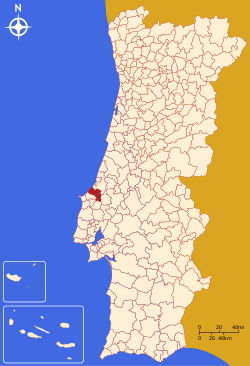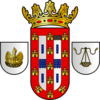Caldas da Rainha
| Caldas da Rainha | |||||
|---|---|---|---|---|---|
| City, Seat of a Municipality | |||||

Statue of Queen Leonor (Rainha Dona Leonor) in the middle of a roundabout in Caldas da Rainha
|
|||||
|
|||||
| Nickname(s): Caldas | |||||
 Municipality of Caldas da Rainha within Portugal |
|||||
| Coordinates: 39°24′26″N 9°8′9″W / 39.40722°N 9.13583°WCoordinates: 39°24′26″N 9°8′9″W / 39.40722°N 9.13583°W | |||||
| Country |
Portugal |
||||
| Intermunicipal entity | Comunidade Intermunicipal do Oeste | ||||
| NUTS I statistical division | Continente | ||||
| NUTS II statistical region | Centro | ||||
| NUTS III statistical subregion | Oeste | ||||
| District | Leiria | ||||
| Historical province | Estremadura | ||||
| Founded | 1484 | ||||
| Vila (town) status | 1511 | ||||
| Concelho/Município (Municipality) | 1821 | ||||
| Cidade (city) status | 1927 | ||||
| Founded by | Queen Leonor | ||||
| Named for | Queen Leonor | ||||
| Freguesias (civil parishes) |
12
|
||||
| Government | |||||
| • Type | Municipality (Município, or concelho) | ||||
| • Body |
Câmara Municipal (executive) Assembleia Municipal (deliberative) |
||||
| • Presidente da Câmara Municipal (Mayor) | Fernando Manuel Tinta Ferreira (PSD) | ||||
| • Presidente da Assembleia Municipal | Luís Manuel Pereira Monteiro Ribeiro | ||||
| Area | |||||
| • Municipality | 255.69 km2 (98.72 sq mi) | ||||
| Dimensions | |||||
| • Length | 24 km (15 mi) | ||||
| • Width | 22 km (14 mi) | ||||
| Highest elevation | 255 m (837 ft) | ||||
| Lowest elevation | 0 m (0 ft) | ||||
| Population (2011) | |||||
| • Municipality | 51,729 | ||||
| • Density | 202.3/km2 (524/sq mi) | ||||
| • Statistical city | 27,378 | ||||
| Demonym(s) | Caldense | ||||
| Time zone | Western European Time (UTC±00:00) | ||||
| • Summer (DST) | Western European Summer Time (UTC+01:00) | ||||
| Postal code (código postal) | 2500 | ||||
| Area code(s) | 262 | ||||
| Municipal holiday | 15 May | ||||
| Website | http://www.cm-caldas-rainha.pt/ | ||||
Caldas da Rainha (Portuguese pronunciation: [ˈkaɫdɐʒ ðɐ ʁɐˈiɲɐ]) is a medium-sized city in western central Portugal in the historical province of Estremadura and the district of Leiria. The city serves as the seat of the larger municipality of the same name and of the Comunidade Intermunicipal do Oeste (OesteCIM, Intermunicipal Community of the West). At the 2011 census, the municipality had a population of 51,729 in an area of 255.69 square kilometres (98.72 sq mi), with 27,378 residing in the city. Although the city itself lies about 10.5 kilometres (6.5 mi) inland, three of the municipality's civil parishes lie on the Atlantic Ocean. Caldas da Rainha is best known for its sulphurous hot springs and ceramic pottery.
The settlement was founded in the 15th century by Queen Leonor (Rainha Dona Leonor), who established a hospital and a church at the site of some therapeutic hot springs. The Hospital Termal Rainha D. Leonor (Queen Leonor Spring Water Hospital, or Thermal Hospital) is the oldest purpose-built institution of its kind in the world, with five centuries of history. The city's name, often shortened to simply "Caldas", can be translated as "Queen's Hot Springs", "Queen's Spa", or "Queen's Baths".
Caldas da Rainha is home to many cultural institutions. The city's nine museums cover art, history, and cycling. Cultural and sports venues include Centro Cultural e de Congressos (CCC, Cultural and Conference Centre), a centre for performing arts, exhibitions, and conferences; Expoeste – Centro de Exposições do Oeste (Exhibition Centre of the West), which hosts exhibitions and festivals; a bullring; several football (soccer) pitches; and a multi-sport municipal complex. Caldas hosts six professional and higher-educational institutions, including a major arts and design school and a school devoted to ceramics. In 2014 Caldas da Rainha had the best public secondary school in Portugal based on national test scores.
...
Wikipedia



